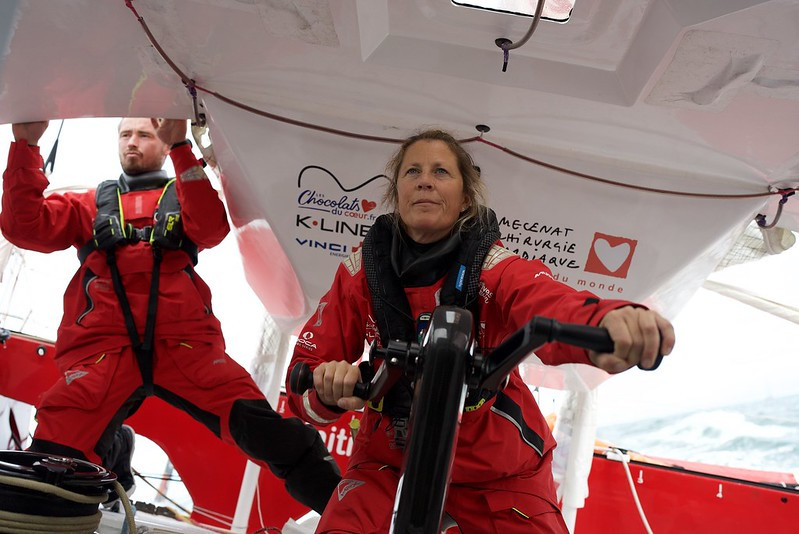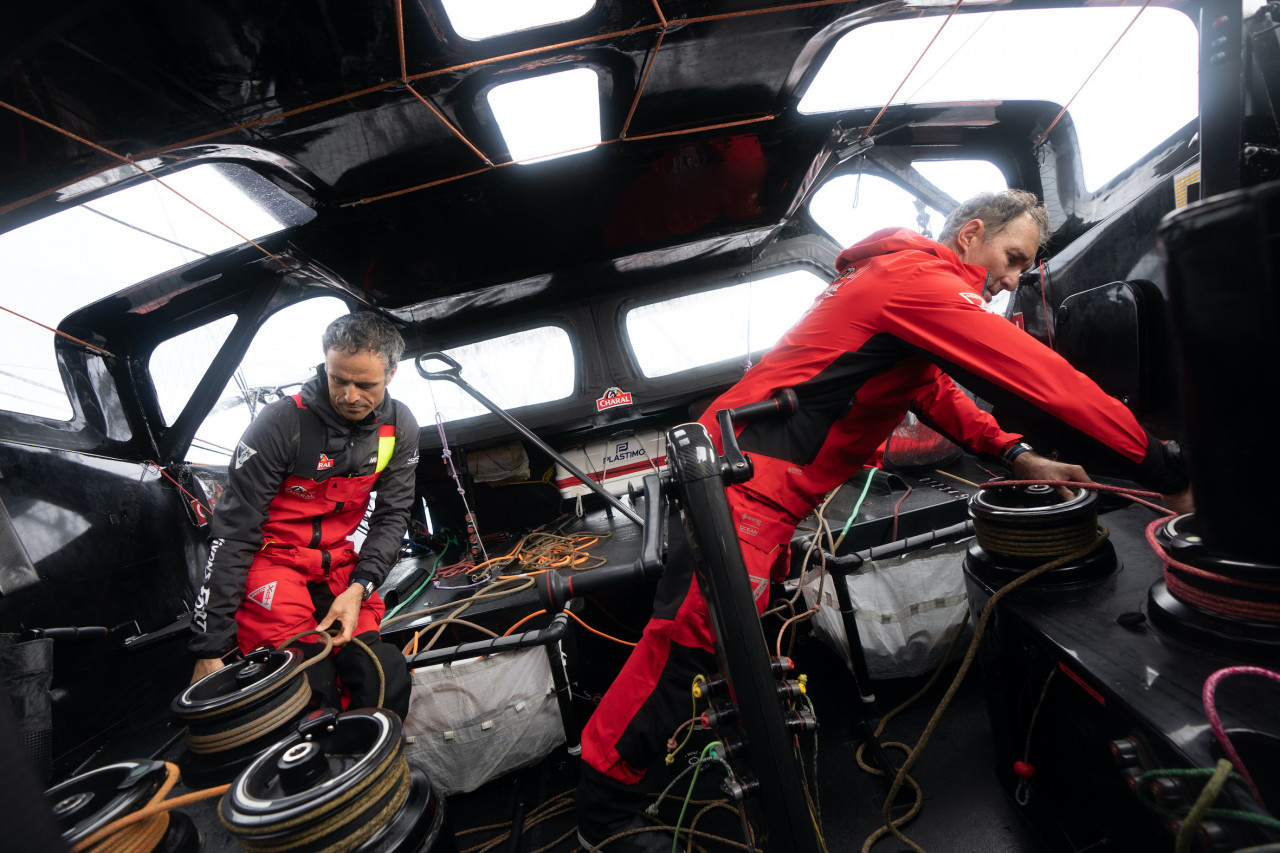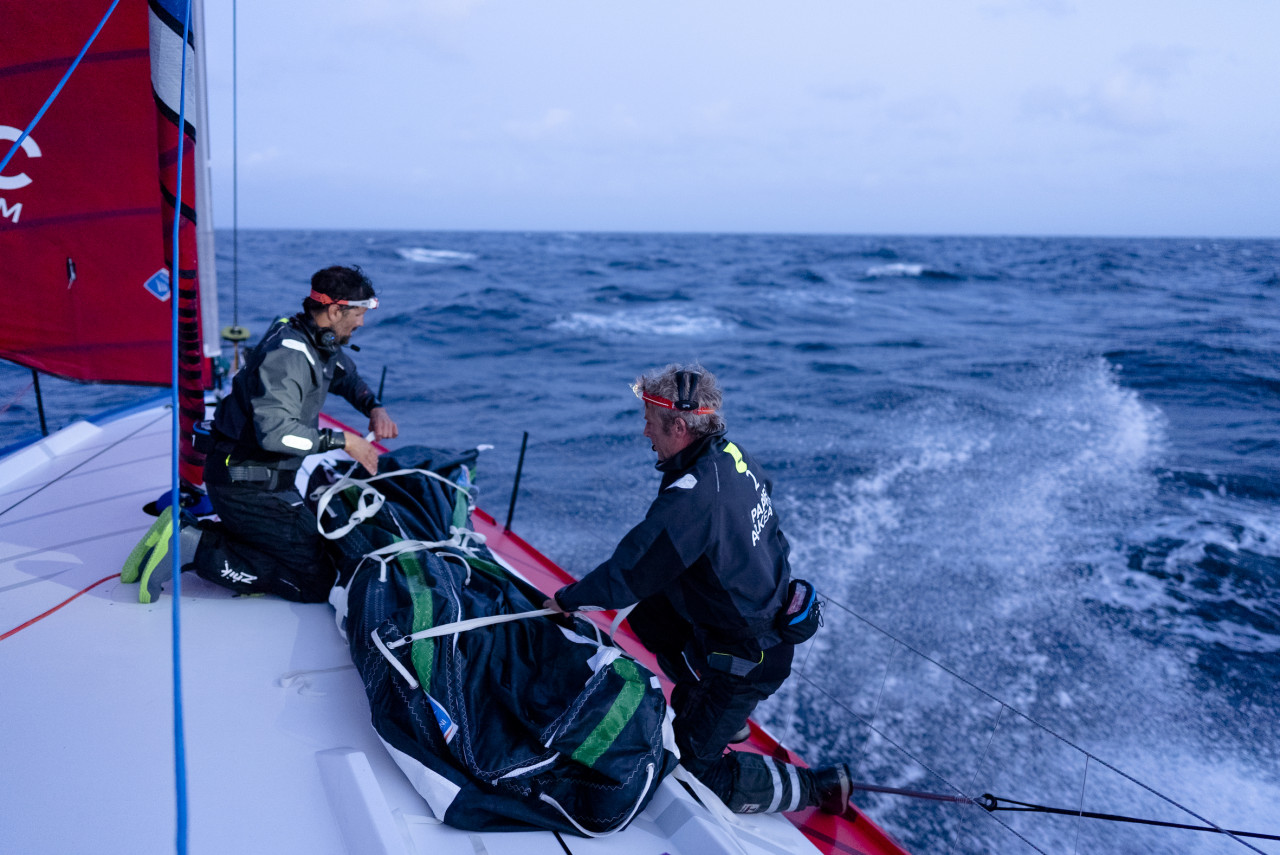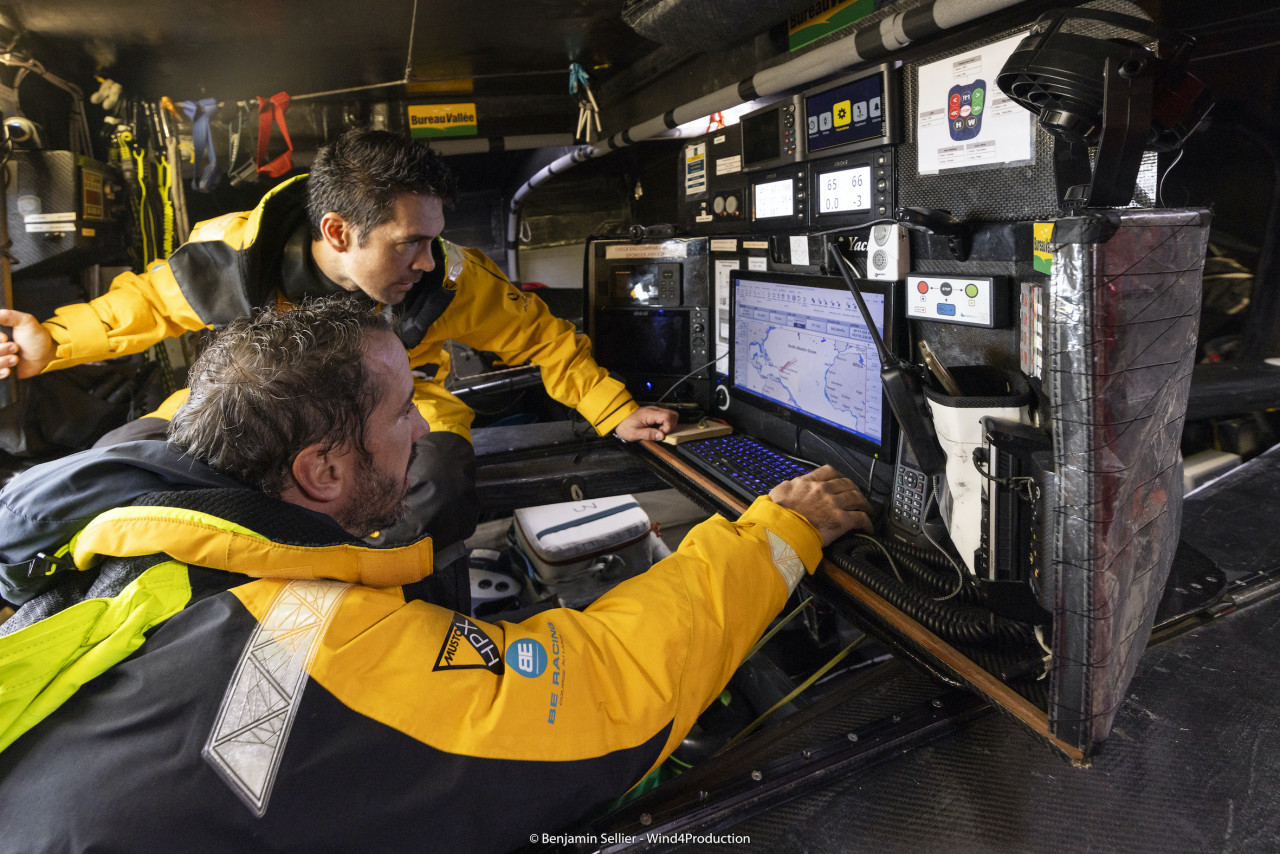After a brutal start, now the challenge of light winds in the Transat Jacques Vabre

After two days at sea, the leading crews in the Transat Jacques Vabre Normandie Le Havre are taking advantage of lighter airs off the Portuguese coast to check on their boats and make repairs after a bruising encounter with a frontal system off Ushant.
The early stages of this biennial classic that finishes on the Caribbean island of Martinique, saw the fleet pound its way around the Brittany coast and then accelerate to the south on a fresh northwesterly airstream that has produced excellent speeds among the foilers and daggerboard boats alike.
At the head of the fleet Jérémie Beyou and Franck Cammas on Charal have been vying for the lead with Thomas Ruyant and Morgan Lagravière on the new For People and Yoann Richomme and Yann Eliès on Paprec Arkéa.
This morning Charal was 32 miles ahead of Paprec Arkéa in terms of distance to finish at a position about 250 nautical miles northwest of Lisbon. For People was in third place, 45 miles behind Charal, with Justine Mettraux and Julien Villion in fourth position on Teamwork, another six miles back.
 © © Maxime Mergalet
© © Maxime Mergalet
On the bright red Sam Manuard-designed Initiatives-Coeur 4, Sam Davies and Jack Bouttell, who are currently in fifth position 66 miles behind the leaders, said conditions off the western tip of Brittany made it very difficult to be on board and to prevent the boat from inflicting damage on itself.
“We had a nice start and had the boat going well in the strong winds,”Bouttell told the Class this morning in a voicenote from on board, as the boat continued south at around 14 knots of boatspeed and with 3,000 miles to go. “But the first night, in the front off Ushant, was pretty brutal and the boat was slamming really, really hard. It was hard to control the speed to find a safe way to sail and Sam and I got pretty beaten up.” Bouttell added that sleep was impossible with the boat crashing into waves at high speed.
On Paprec Arkea, Richomme was also concerned about serious damage on a boat on which they suffered two broken bunks as a result of the slamming. “We had to get through the front as planned on Wednesday morning,” he recalled. “The wind shifted very quickly, so we had to make a big manoeuvre. After that we were bombarded all day. The speed averaged 23 knots in the middle of the day and the sea conditions meant that we had to be extra careful. It was quite violent and sometimes we tried to calm the boat down to avoid the risk of breaking it.”
 © Yann Riou / Polaryse
© Yann Riou / Polaryse
The strong winds and big seas took a toll on the fleet with seven boats having to return to port. They are Biotherm (mainsail damage), Groupe APICIL (broken boom), Lazare (water ingress), Stand As One (structural failure), MACSF (mainsail damage), Oliver Heer Ocean racing (rigging failure), Be Water Positive (medical issue).
Out on the racecourse there has been time for repairs as well. “The boat is holding together pretty well,” said Bouttell. “We’ve had a few little damages here and there – a few little blocks and things, but in this lighter wind now, we’ve fixed a few things and got it all going again.”
The weather has been one challenge, but on Louis Burton and Davy Beaudart’s Bureau Vallée, they also had to contend with a five-hour penalty for a startline infringement. They decided to take it straight away, a move which enabled them to avoid some of the worst weather as the front came through.
“It’s always very upsetting to take a penalty,”admitted Burton, the super-competitive sailor from St Malo. “We quickly concentrated on finding the best place to take it, and we chose to take it fairly quickly and take advantage of it, so we didn’t have to deal with the front where it was strongest. From that point of view we are quite happy.”
The next big challenge for the skippers and co-skippers is how to pick their way through a complex area of light winds centred southwest of Lisbon that will slow their progress towards the Canaries Islands and onto the tradewinds. There are plenty of opportunities ahead for trailing boats to catch up and for leaders to sail into areas of calms.
 © © Benjamin Sellier
© © Benjamin Sellier
Burton says all options are on the table and there could be big decisions ahead. “There’s going to be a possibility of going for options west, or north, or south,”he explained. “But the point of convergence for making that decision is Portugal, so it’s normal that everyone has been heading for Cape Finisterre.”
Richomme is also thinking hard about his strategy. “The next step is to make headway towards the Portuguese coast,” he said. “After that we’ll be looking for the anticyclone to the south of Portugal, where we’ll be able to slip through and pick up the tradewinds.”
This course is going to be much less stressful than a more direct or northerly route across the Atlantic, that would require skippers to deal with a succession of weather fronts, and Richomme says it is also a lot less stressful than the opening phase of the race off Brittany.
“All in all, this is a much less testing programme than the start of the race and that’s no bad thing,” said the two-time Figaro and Route du Rhum winner. “Starts like that are very tiring, but we’ve managed to rest well for the rest of the race.”
Ed Gorman
Teams info
Charlie Dalin: Raring to go on his first solo The Transat CIC
It’s good to see Charlie Dalin back where he belongs, at the helm of his almost brand new Guillaume Verdier IMOCA, Macif Santé Prévoyance, ready to take on the north Atlantic in The Transat CIC.
•••François Guiffant – a solo sailor waiting for his ticket to the Vendée Globe
One thing that can be said with certainty about François Guiffant is that he knows the IMOCA game and its boats as well as anyone.
•••